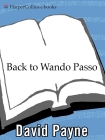Back to Wando Passo by David Payne (each kindness read aloud txt) 📗

- Author: David Payne
Book online «Back to Wando Passo by David Payne (each kindness read aloud txt) 📗». Author David Payne
“What does that mean?”
“It means they bring the dead to life. No, let me strive to be exact with you. There is no death, Addie. Those whom we call ‘the dead’—they’re known as ‘muertos’ there—don’t die at all. They shed their bodies, yes, but their souls, their ‘almas,’ pass on to new life in a different realm from ours. These teachings, in their principles, are not so different from ours. The difference is, these priests of whom I speak—those who possess the secret, ‘el secreto’—have the power to summon them, to call the dead back down into the human realm again to work with us, the living, to cure, protect, and save, and sometimes also to destroy. Do you grasp what I’m saying?”
“This can’t be true, though, is it?”
“It can and is. I’m an Episcopalian, Addie. I believe in God the Father Almighty, Maker of Heaven and Earth, and in Jesus Christ his only Son our Lord…. I believe in the Holy Ghost, the holy Catholic Church, the Communion of Saints, the Forgiveness of Sins, the Resurrection of the body, and the Life Everlasting. Before I went to Cuba, how many Sundays had I, like you, perhaps, sat patiently in church and said those words? How many Sundays did I kneel and pray and rise and sing and sit again on cue? I thought that was the human lot, Addie, to sit patiently in the family pew Sunday after Sunday, waiting, hoping against hope and praying that the death of the body didn’t mean ‘cessation,’ as you put it yesterday, did not entail the soul’s extinction. I’d never dreamed that it was possible to know. To know, Addie.”
“But you do?” she asks. “You know this now?”
“I’ve seen it, Addie. Seen with these two eyes. Not once. A hundred times.”
“But how did you…How did this happen?”
“The religion is called Palo Mayombe, Addie. It’s practiced mainly among the Congo slaves. Paloma introduced me to her godfather, her padrino, an old Congo named Demetrio. Through him, I eventually found my way to Andrés Petit, a free mulatto, one of the most impressive men I’ve ever met. It’s hardly too much to say he is a kind of Cuban Luther or John Calvin. He founded a line of Palo called Kimbisa, La Regla Kimbisa del Santo Cristo del Buen Viaje, the Kimbisa Order of the Holy Christ of the Good Journey. The first time I approached him—in Guanabacoa—he rebuffed me, yet he did so with great warmth and suavity. I tried three or four more times before Petit became convinced of my sincerity. I was among the first whites to be allowed to glimpse the mysteries, and there were those who thought none of la raza blanca, much less a slaveowner like myself, should be allowed into the templo. To this day, some consider Petit a Judas, who sold the secret ‘por ochenta onzas,’ for eighty pieces of silver. And it was true, he charged me, but money—that was not the reason.”
“Why did he admit you?”
“Because he looked into my eyes and saw that I was grieving for my wife, he saw that I was in despair and thirsting for the truth. He admitted me because I was persistent and sincere and willing to humble myself to him, and because, in the end, he was able to see me not simply as a blanco, a white man, but as a human being, ‘un profano que anda errante y desea pertenecer,’ one wandering lost and wanting to belong. And he pitied me and took me in. My old religion, the faith in which my parents raised me—this came to seem a child’s toy, a wooden sword, but Palo, Addie, Palo was a blade of mighty power that cut to heal.
“I was initiated in Havana, in la calle Ancha del Norte, número 115. I made juramento. I took the fourteen vows and sealed them with my blood. For two years, I attended fechas in Havana with Petit, but most of what I learned was at La Mella, from Demetrio, who took me as his godson, too. By day, I worked in the boiler house, by night I danced and sweated side by side with the same men who fed bagasse, cane waste, into the boiler’s fires. By day, I gave them orders; by night, I made obeisance to them as my elders in the faith. We looked into each other’s eyes and shared the secret silently. I’d lived with Negroes all my life, but, strange to say, I’d never looked into their eyes and seen their characters as men. I learned to do that there, to see them as Petit saw me. Paloma and I fell in love. I fell terribly and utterly. Looking back, those two years were the best of my whole life. And the strange thing was, it was as if I, not they, had been enslaved, and for that time my chains were loosened. There among the least were truths and answers that we, the so-called great and privileged, had forgotten if we ever knew. It was as though I’d stumbled on the thing that all men spend their lives seeking in vain—the certainty that there is life after death, that those we’ve loved and lost continue to live on, that the soul persists, that it’s immortal and imperishable. More than this, Addie, I learned that there are beings more elevated than the dead, our ancestors. They’re sometimes called ‘santos,’ though ‘saints,’ the Catholic term, is only a





Comments (0)